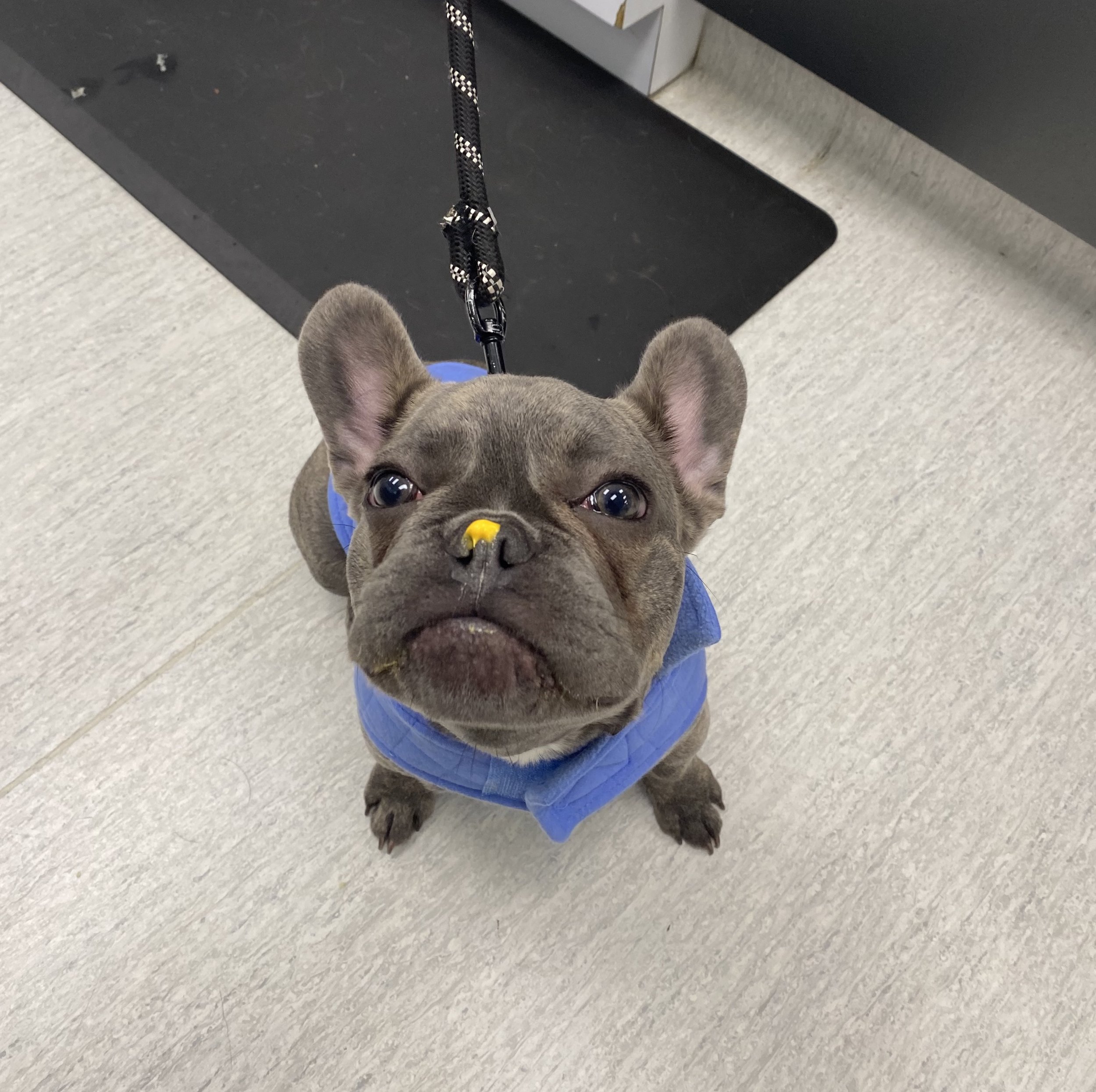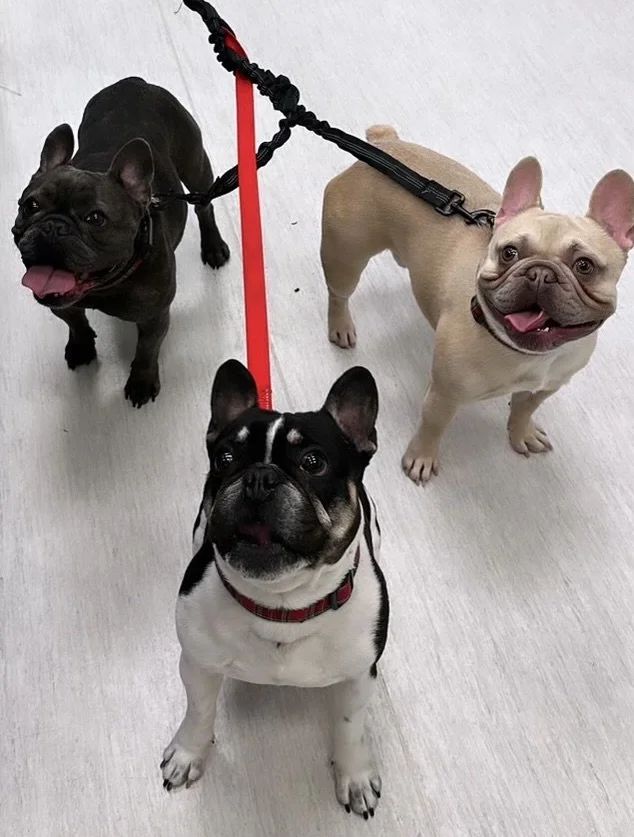The Most Popular Dog Breed of 2023: The Frenchie
The French Bulldog tops the charts (and our hearts,) for a second year in a row!
Recent data from the American Kennel Club, confirms that the affectionately nicknamed Frenchie reigns as the most popular canine breed in the United States. We’re no strangers to the joys of the bold and beautiful French Bulldog. Here are some tips of what to expect while owning one!
by Alyssa H., Veterinary Technician and Continuing Education Coordinator
Peer Reviewed by Dr. Sapato, BLVD Vet Logan Square Medical Director
Because of their brachycephalic build and small frame, French Bulldogs are prone to several different health conditions. At BLVD, we can help you to care for your French Bulldog and give them a long, happy life!
Diet
While it is important for every pet to be on a balanced diet, it is even more important for Frenchies. Because of their compact frame, excess weight can cause increased skin infections, back and joint pain, and cause breathing difficulty. Because of this, keeping your Frenchie on a complete and balanced, commercial diet that includes grain is important for their long term health. Take a look at our blog post, Feeding My Dog 101, for information on why we recommend a commercial, grain inclusive diet.
If your dog is experiencing signs of illness related to diet and digestion, you might see that they have stools that vary in consistency. Some days your dog’s stools may be solid and easy to pick up, and other days it may be diarrhea. The stool consistency can even be different throughout the day. Other signs include vomiting, passing gas, stomach gurgles or noises after eating, and unexpected changes in weight.
Our doctors have experience with digestive disorders, and use both imaging (like radiographs and ultrasounds) and blood tests to help determine the best course of treatment for your dog. Starting this fall, when your veterinarian recommends an abdominal ultrasound, it can be completed by a Boulevard Veterinary Technician who is familiar with your pet!
Lean Body Weight
For French Bulldogs, a lean body weight is one of the most important aspects of good health. Excess weight is associated with a higher risk of joint disease, knee ligament tears and back pain in dogs. Frenchies are bred for their short stature, but still have all of the same bones, organs and body structures as a regular sized dog! Excess weight on their small frames makes it more difficult for french bulldogs to move around, can cause pain and discomfort, and even lead to difficulty breathing.
A Frenchie with excess weight on their frame will have a more round appearance, and when you touch their chest it will be more difficult to feel their ribcage. They may snore more frequently, and will get tired on long walks or play sessions.
Your BLVD veterinarian will determine if your Frenchie would benefit from weight loss, and guide you on how to safely reduce their food amount to reach these goals. Sometimes a diet change may be necessary. Thanks to Hill’s Science Diet Prescription products, your vet can send you home with a small bag of specialized weight loss food at the time of your appointment to kickstart your pet’s goals.
Joints
As your French Bulldog ages, you may notice that they start having more difficulty going up and down the stairs. They may even be a bit stiff when getting up from a nap, or cry out when you quickly pick them up. There are many different reasons why these signs could be appearing in your pet, but the most common two are joint and back disease (IVDD). This is once again due to the compact frame that comes with being a French Bulldog.
If you notice any of these signs in your own pet, it’s important to have them evaluated by a veterinarian as soon as possible. Once diagnosed by either your regular boulevard veterinarian or by an emergency doctor, we can help your pup manage this disease long term.
When it comes to knee and hip injuries that require orthopedic surgery, we work with Chicago Specialty Surgery’s Dr. Marc Wosar to complete procedures from the comfort of your regular veterinary office, with a technician team that your pet is already familiar with.
Skin
Does your Frenchie have a cute button tail? How about a tiny snout with distinctive wrinkles around their face? What gives French Bulldogs their unique physical appearance can also give owners and veterinarians unique challenges to keep up with. Extra skin folds, most common around the face and tail in Frenchies, can harbor fungi and bacteria that can wreak havoc on your dog’s skin.
When moisture is trapped in between layers of skin, bacteria and fungi that normally exist in small numbers on the skin’s surface can overgrow. This causes skin irritation and infection.
You may notice a new and unpleasant odor coming from your dog, or red, irritated skin. Some infections can cause hair loss, and others can cause your dog to become very itchy. We don’t always catch our dogs scratching itchy areas with their paws- oftentimes they will lick and bite at the area. If your dog licks an area of light colored fur excessively, they will cause the fur to become brown. This is known as “saliva staining” and is a common sign of an itchy pet!
If you notice any of these signs, it’s important to take a visit to your BLVD veterinarian. They can prescribe medications to relieve itching and infection, as well as create a maintenance plan to limit repeat episodes of skin irritation. At our Logan Square, Ravenswood and River North locations, laser therapy can be completed on the area to speed up the healing process!
Breathing
Is your Frenchie’s breathing so loud you can hear it nearly all the time? Do they snore? If so, you aren’t alone! Due to their short snout and compact head (called brachycephaly), French Bulldogs are prone to breathing problems. In some cases, the soft, flexible tissues in the back of the mouth and throat obstruct airflow, which makes it difficult for your dog to breathe normally. This is what makes the audible breathing noise that is common in all types of bulldogs, not just frenchies!
At BLVD Vet, we are lucky to have not just one, but two doctors that have experience in surgically correcting the tissue obstruction caused by French Bulldog anatomy. Your regular BLVD veterinarian will evaluate your dog and will recommend the procedure if it is needed. Both Dr. Cruz at Logan Square and our Board Certified Surgeon, Dr. Wosar, are able to complete these procedures, all which are done in the comfort of your regular veterinary practice alongside veterinary technicians who your pet knows and trusts!
Oral Health
Adult dogs have a total of 42 permanent teeth. These include incisors, canines, premolars and molars. With a compact jaw and face, Frenchies often are either missing some of these “standard” teeth or experience crowding because there is not as much room in their mouths as a standard sized dog. Crowding can cause increased plaque and tartar buildup because there are more contact points and crevices between teeth where bacteria can grow.
Some signs your dog might be experiencing issues with their oral health include having smelly breath and visible plaque or tartar that discolors or covers the tooth surface. In some cases, you may notice their gums change in color from a light pink to an angry red color around the base of the tooth. Your dog may have difficulty chewing bones or hard treats, dropping pieces of them on the ground as they try to eat. In severe cases, your dog may stop eating altogether due to pain inside the mouth.
If you see any of these signs, it’s important to get them in for a veterinary visit for an oral exam. Your vet will take a look at the teeth and gums to determine if it is time for a professional cleaning under anesthesia. It’s not uncommon for French Bulldogs to need multiple professional cleanings in their lifetime, sometimes as frequently as once per year.
Be sure to ask your veterinarian at your dog’s next appointment how you can help improve their oral health at home!
Insurance
We recommend getting pet insurance for all pets, and especially those at risk of breed-associated conditions, like French Bulldogs. Pet insurance can help cover the cost of expensive emergency visits, medical conditions and surgeries. At BLVD, clients use a variety of insurance companies, including Pumpkin, Nationwide, Pet’s Best, Lemonade, ASPCA and Embrace. Insurance claim submission and reimbursement is completed directly between you and your insurance company, therefore all companies can be used at our offices.
We specifically recommend Pumpkin Insurance because there is an affordable wellness coverage plan that includes the vaccinations and annual blood panels that we recommend at wellness visits.
No matter which company you choose, make sure to read the fine print on your coverage agreement. Not all plans are equal!
We hope you find these tips useful and that they help keep your Frenchie friends happy and healthy! Don’t hesitate to reach out if you have any questions. We’re always here for you and your pets.
Sincerely,
The BLVD Team





